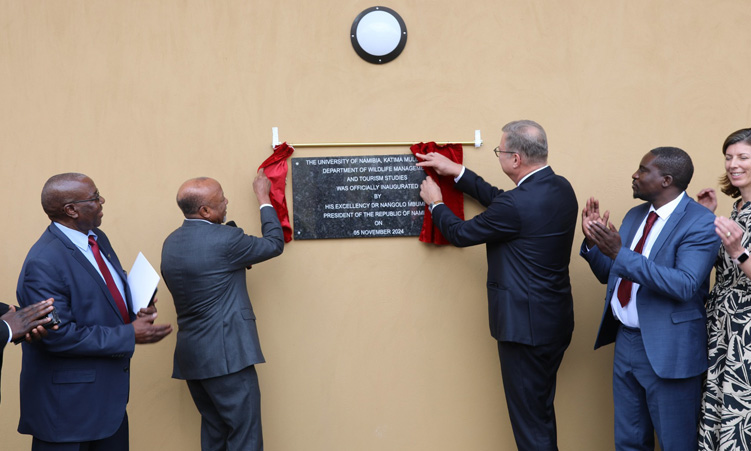The University of Namibia (Unam) officially inaugurated the extension of its department of wildlife management and tourism studies at its Katima Mulilo campus yesterday.
The extension was inaugurated by president Nangolo Mbumba.
“Today marks a historic milestone for the Kavango-Zambezi Transfrontier Conservation Area (Kaza-TFCA) as we officially inaugurate the extension of the department of wildlife management and tourism studies at the Unam Katima Mulilo campus,” he said at the event.
“Today, we can take pride in our growing capacity through Unam and other tertiary institutions to provide targeted, effective and relevant solutions pertaining to community challenges, the environment and wildlife.”
Mbumba said in the past, “Africa, and in particular Namibia, lacked the capacity to build its own human resources. We were unable to produce graduates with high-level competence and skills to conduct research, analyse and diagnose problem areas and formulate evidence-based policies.”
The Zambezi region and the greater Kaza-TFCA face numerous challenges, such as a multitude of infectious and parasitic livestock diseases, he said.
“Therefore, Unam’s prioritisation of animal health and wildlife management courses are timely and relevant.”
Unam introduced a diploma in animal health at its Katima Mulilo campus in 2014.
Mbumba also stressed the importance of tourism.
“Tourism is a key sector in the economic and social development of Namibia and the southern African region.
“The establishment of the department of wildlife management and tourism will enable local communities from Zambezi, and I hope from the five countries comprising the Kaza-TFCA, to send university-aged students to tap into the educational opportunities at their doorsteps,” the president said.
The Kaza-TFCA includes areas in Namibia, Angola, Botswana, Zambia and Zimbabwe.
Mbumba referred to the increase in human-wildlife conflict in the Zambezi, Kavango East and West and Kunene regions.
“Unam’s presence here will empower Namibia’s human resources with the required know-how to help craft strategies for a peaceful human-wildlife co-existence,” he said.
Livelihoods for people in the region will improve as they benefit from the flora and fauna through tourism, Mbumba said.
“Communities who are aware of the mutually beneficial relationship between themselves and their environment could be keen to readily play the role of grassroots-based conservationists.”
He expressed his gratitude to the government and people of Germany for development support and cooperation since Namibia’s independence.
German ambassador Thorsten Hutter also attended the event at Katima Mulilo.
Unam has around 50 active partnerships with German universities.
“I am convinced that Germany and Namibia will continue to share similar positive views on development and cooperation,” Mbumba said.
Stay informed with The Namibian – your source for credible journalism. Get in-depth reporting and opinions for
only N$85 a month. Invest in journalism, invest in democracy –
Subscribe Now!


